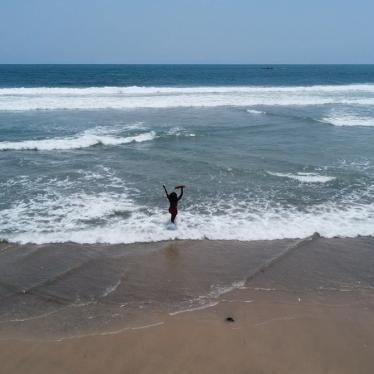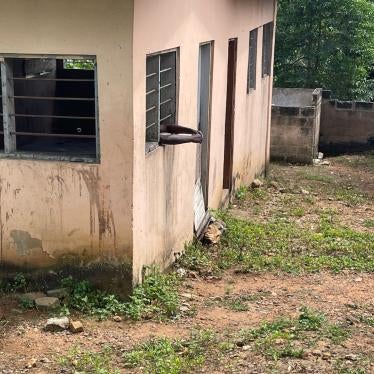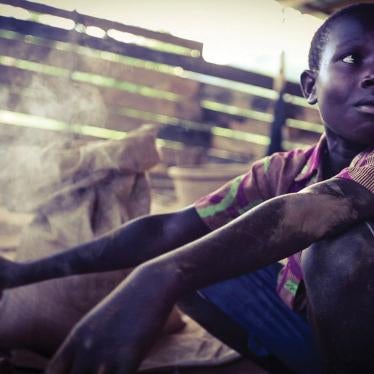July 2014
Dear Members of the Committee on the Rights of the Child,
We write in advance of your upcoming pre-sessional review of the Ghanaian government’s compliance with the Convention on the Rights of the Child. Informed by Human Rights Watch’s recent investigations, including firsthand research with children, this submission contains up-to- date findings on Ghana’s treatment of children that appear to violate the following Convention articles, among others: articles 3, 6, 18, 23, 24, 25, 26, 27, 28, 31, and 32. We also found government policies and practices inconsistent with the committee’s General Comment No. 16. This submission highlights concrete steps that the Ghanaian government should be asked to take to address these serious problems.
Human Rights Watch has extensively documented child rights violations relating to child labor and abuses against children with mental disabilities. In particular, we have conducted field investigations in child rights violations in the context of artisanal gold mining (Western, Central, and Ashanti region) and the treatment of children with disabilities in psychiatric hospitals (Accra, Nyakumasi ).
Hazardous child labor
Articles 6, 24, 27, 31, 32
The International Labor Organization (ILO) identifies mining as one of the most hazardous sectors and occupations because of the high rates of death, injury and disease.
In Ghana, children who work in artisanal gold mining risk ill-health or accidents from deep falls into pits, collapsing pits, flying rocks or shard, dangerous tools and machinery, continued exposure to dust, transport of heavy loads, and the use of toxic mercury. The majority of artisanal mines in Ghana is operating without a valid license, and child labor has been observed in such sites. Human Rights Watch has been unable to ascertain whether licensed sites use child labor.
Under the 1998 Children’s Act, work in mining is explicitly prohibited for anyone under 18. Ghana
has ratified international standards on child labor, including ILO Convention 182 on the Worst Forms of Child Labor.[1] Although the government has developed an action plan and put in place a national steering committee to address child labor, such efforts rarely reach the artisanal mines. The few programs that address child labor in mining are run by international agencies and nongovernmental organizations and are limited in scope.
The risks connected to mining work are illustrated by a mining accident that killed 16 people near Kyekyewere, Upper Denkyira East District, Central Ghana on April 15, 2013. Among those who died was Abroso Kwabena Donkor, an orphan who had been living with his maternal aunt after his mother’s death. Abroso had dropped out of school after 6th grade and had worked in artisanal gold mining full-time since the age of 15. He was working at the mine with his aunt and uncle, who survived with injuries.[2]
Human Rights Watch interviewed 20 members of the community near the site of the mine collapse, including 8 children who worked in or near the mine. The children said they carried ore from the pit to the processing place, panned and washed the ore, and used mercury to retrieve the gold. They said they usually went in groups on their own initiative, and used the money to buy desired items such as clothing, or gave the money to their family.[3]
The accident occurred at an abandoned mine, which had been run by a Ghanaian miner and a Chinese businessman without a license.
In addition to accidents, children risk ill-health and permanent disability from exposure to toxic mercury used for gold processing. Mercury attacks the central nervous system and is particularly harmful to children. It attacks the central nervous system and can cause irreversible developmental and neurological problems. Mercury is added to the ore to create a gold-mercury amalgam, and then burned off, releasing toxic vapor and leaving the raw gold behind. Child laborers often handle the mercury with their bare hands and breathe the mercury fumes when burning it off.
One 12-year-old boy from Central region told Human Rights Watch:
I am in 4th grade in primary school. I collect the mud. I bring a pan to those digging, and they fill in the mud, and I take it to those doing the washing. I go there during weekend and vacation. I am paid about 10-15 cedis [approximately US$3-5] a day. I also do the washing
[processing] sometimes. I work with mercury. I mix it into the ore. I have also done burning [of the amalgam]. We buy the mercury. Or the buyer gives it.[4]
Another 12-year-old boy who was involved in crushing, carrying, and processing ore showed Human Rights Watch the flask of mercury he was carrying always in his pants’ pocket.
Girls and boys also carry ore from mining sites to processing sites, in order to earn money for their family, for their own upkeep, and for school-related costs. Several children complained of pain in their neck, head, and back.[5] Carrying heavy loads can cause muscular-skeletal conditions later in life.
Several traders told Human Rights Watch that they were buying from anyone who was selling gold, and that they did not have any particular requirements when buying gold.[6]
Recommendations
The Committee on the Rights of the Child should urge the Ghanaian government to:
- Ensure that labor and mining officials regularly inspect licensed and unlicensed mines, withdraw children from mining work, and impose penalties on those who employ child labor.
- Strengthen and intensify efforts to formalize the artisanal and small-scale gold mining sector, as one strategy to reduce child labor; this should be done without engaging in a mass clampdown on unlicensed mining activity.
- Address the threat of mercury by:
- Urging an immediate end to mercury use by anyone under age 18 as part of broader efforts to raise awareness and to promote mercury-free alternatives;
- Developing a health response to address mercury exposure and poisoning in artisanal mining communities, with a focus on child health.
-Signing the Minamata Convention on Mercury before October 9, 2014, the latest date possible for signature, and subsequently ratify and implement the Convention.
Right to Education
Article 28
Children who work in mining miss out on important educational opportunities and experiences. Some children who work in mining have dropped out of school, while others combine work and school. Child labor in mining also affects school attendance and performance.
Fifteen-year-old “Kofi” told Human Rights Watch that he had been working in artisanal gold mining since he was 12 or 13, and that he often skipped school to go to the mine instead. When he started mining work, he carried the mud from the pit to the processing site, causing serious back pain. He switched to processing the mineral, regularly working with mercury. Asked whether he will continue this work after the accident, he said, “I cannot stop this work.”[7]
Other residents, including a 13-year-old child laborer, confirmed that children sometimes work in artisanal gold mining to earn money for school supplies or fees.
Recommendations
The Committee on the Rights of the Child should urge the Ghanaian government to:
- Ensure that primary education is truly free of charge, and ensure access to primary and secondary education, as well as vocational training, in mining areas.
Basic Health and Welfare
Articles 3, 18, 19, 23, 24, 26, 27
Children with disabilities enjoy all the rights enumerated in the CRC, and are, “by reason of [their] physical and mental immaturity,” in need of “special safeguards and care, including appropriate legal protection.”[8]
Ghana’s constitution expressly prohibits subjecting a child to torture or other cruel, inhuman, or degrading treatment or punishment.[9] It also prohibits depriving a child of medical and other benefits on the basis of religious or other beliefs.[10] The constitution empowers parliament to enact laws to ensure that every child, regardless of disability, has a right to the same measures of special care, assistance, and maintenance as is necessary for their development.[11]
The 1998 Children’s Act prohibits discrimination against a child on the grounds of disability or health status, among others and guarantees the best interest of the child in any matter concerning his or her welfare.[12] The act further prohibits treating a child with a disability in a non-dignified manner and entitles children to a right to special care that can develop their maximum potential and self-reliance.[13]
During its field research in Ghana, Human Rights Watch interviewed or observed children with psychosocial or intellectual disabilities who are forced to live in psychiatric institutions and spiritual centers with little possibility of changing their confinement, although these do not provide appropriate treatment. In psychiatric hospitals, adults and children with disabilities live together, and face overcrowding and unsanitary conditions.
For instance, the Children’s Ward at Accra Psychiatric Hospital houses people ranging from 14 to 40 years of age. Most patients in the ward did not have mental health conditions but were diagnosed with epilepsy or intellectual disabilities such as Down syndrome.[14]
Human Rights Watch researchers saw filthy living conditions in the Children’s Ward with some children and adults lying down naked next to their feces. There was also a severe shortage of staff members in the Ward, and a nurse said they lacked the resources to provide stimulating activities such as games and television, or the skills to engage the children and handle those with intellectual disabilities.[15] Persons in the Children’s Ward received medication, but not all who did so needed it. According to one nurse some persons in the Ward receive psychotropic drugs because they are so restless, not because of a psychiatric condition.[16]
According to one nurse,
while no one on current admission has a psychiatric condition, some of them receive psychotropic drugs because they are so restless. We don’t have access to alternative services that would stimulate these children. In any case, we lack the necessary skills to handle children with intellectual disabilities since we [were] train[ed] to deal with psychotic adult cases.[17]
In some spiritual healing centers, popularly known as prayer camps, Human Rights Watch documented more than a dozen cases of children, mostly girls who were considered “witches”, who were chained to trees and forced to fast for weeks as part of a “healing process,” while being denied access to medications. Children in prayer camps were detained in overcrowded, unsanitary rooms along with adults, including some who would strip naked.
In 2012, Human Rights Watch interviewed one 9-year-old boy in the Edumfa Prayer Camp (in Central region) who was chained in the same room as 20 other males. He told researchers he had been fasting for 21 days.[18] A 10-year-old girl in the Nyakumasi Prayer Camp (in Central region) told researchers that she had been chained 24 hours a day by her legs to a tree in an open-air compound for nearly one year. She could move beyond the length of the chain (about 2 meters), and had to defecate, urinate, eat, and sleep in the same spot where she was chained. She defecated in plastic bags which were thrown nearby. She had a serious skin disorder with crusting and bumps on both arms, for which she was not receiving treatment.[19]
In late 2013, the United Nations Special Rapporteur on Torture also observed extremely disturbing practices in the two prayer camps he visited. He documented cases of shackling and fasting forced on persons with psychosocial disabilities or in some cases with neurological problems, including children. In Edumfa Prayer Camp, men, women and children were shackled to the walls or floors of their cells. The building holding adult males contained 16 concrete cells laid out like cattle stalls. There was a separate building for women and juveniles where 10 persons were chained to the floor, including a 14-year-old girl and a 7-year-old boy, who exhibited symptoms not of a psychosocial disability but of a neurological disease that required specialized treatment and medication.[20]
Both the Special Rapporteur on Torture and Human Rights Watch recommend enacting laws to prohibit the admission and treatment of children in prayer camps.[21] Banning the admission and treatment of children in prayer camps would also further comply with Article 19 of the Convention on the Rights of the Child.
Recommendations
- Prohibit admission, treatment and other forms of inhumane treatment of children in prayer camps, and other practices like locking in rooms with adults, and other forms of inhumane treatment, which would compromise their development and enjoyment of rights as children.
- Investigate and prosecute those who do not adhere to these principles.
- Immediately improve conditions in psychiatric hospitals by providing adequate food, shelter, hygiene and health care.
- Provide affordable healthcare and other social forms of support to allow children with disabilities to live with their families, including in rural areas.
- Conduct a public information campaign to raise awareness about mental disability and disability rights, especially among alternative mental health service providers and the broader community, in partnership with organizations of persons with mental disabilities, their families and media.
We encourage the Committee to take these findings into account during Ghana’s pre-sessional review. In particular, we recommend that the Committee request the Ghanaian government to provide information that demonstrates how its commitments will contribute to concrete improvements regarding hazardous child labor and the treatment of children with mental disabilities.
Thank you for your attention to our concerns, and with best wishes for a productive pre-session.
[1] “Ghana Mine Accident Highlights Risk to Children,” Human Rights Watch news release, June 13, 2013, https://www.hrw.org/news/2013/06/13/ghana-mine-accident-highlights-risk-children.
[2] “Ghana Mine Accident Highlights Risk to Children,” Human Rights Watch news release; Human Rights Watch interview with aunt of Abroso Kwabena Donkor, June 1, 2013, Upper Denkyira district, Central region, Ghana.
[3] Human Rights Watch interviews, June 1 and 2, 2014, Upper Denkyira district, Central region, Ghana.
[4] Human Rights Watch interview with boy, age 12, June 1, 2013, Upper Denkyira district, Central region, Ghana.
[5] Human Rights Watch interviews, April 1 to 5, 2014, Western and Ashanti region, Ghana.
[6] Human Rights Watch interviews, April 1 to 5, 2014, Western and Ashanti region, Ghana.
[7] Human Rights Watch news release, “Ghana Mine Accident Highlights Risk to Children.”
[8] Convention on the Rights of the Child, Preamble.
[9] Constitution, art. 28 (3).
[10] Ibid., art. 28 (4).
[11] Ibid., art. 28 (1).
[12] Children's Act, 1998 (Act 560), Ghana, December 30, 1998, art. 2, art. 3, http://www.unhcr.org/refworld/docid/44bf86454.html. (accessed September 11, 2012).
[13] Ibid., art. 10 (1) and (2).
[14] Human Rights Watch, Like a Death Sentence: Abuses against Persons with Mental Disabilities in Ghana, October 2012, https://www.hrw.org/reports/2012/10/02/death-sentence-0.https://www.hrw.org/sites/default/files/reports/ghana1012webwcover.pdf.
[15] Human Rights Watch interview with a nurse, Accra Psychiatric Hospital, November 16, 2011.
[16] Ibid.
[17] Ibid.
[18] Human Rights Watch interview with Solomon (pseudonym), resident, Edumfa Prayer Camp, Central Region - Cape Coast, January 19, 2012.
[19] Human Rights Watch interview with Victoria (pseudonym), resident, Nyakumasi Prayer Camp, Central Region,January 19, 2012.
[20] Report of the Special Rapporteur on torture and other cruel, inhumane or degrading treatment or punishment, Juan E. Méndez, Addendum-Mission to Ghana, A/HRC/25/60/Add.1, May 3, 2014, at 14, http://ap.ohchr.org/documents/dpage_e.aspx?m=103.
[21] Report of the Special Rapporteur on torture and other cruel, inhumane or degrading treatment or punishment, Juan E. Méndez, Addendum-Mission to Ghana, A/HRC/25/60/Add.1, May 3, 2014, at 22, http://ap.ohchr.org/documents/dpage_e.aspx?m=103; Human Rights Watch, “Like a Death Sentence”: Abuses against Persons with Mental Disabilities in Ghana, October 2012, at 84, https://www.hrw.org/sites/default/files/reports/ghana1012webwcover.pdf.







